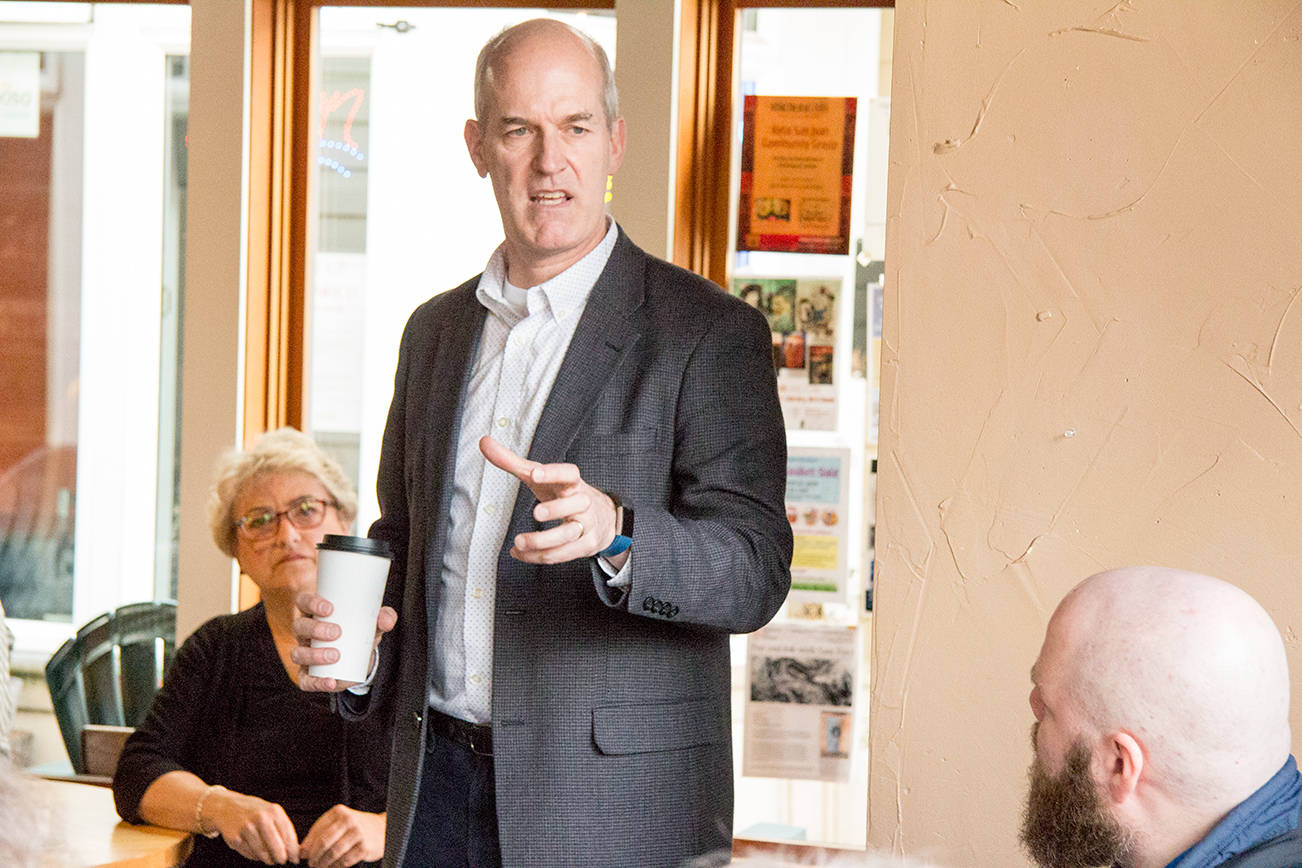Rep. Rick Larsen met with constituents among the clank and clatter of plates and cups at The Bean Cafe in Friday Harbor.
A dozen community members gathered around tables to speak with Larsen about topics affecting their lives on Saturday, April 6.
“It’s the best coffee, that’s why we do it here,” Larsen joked. “The acoustics in here aren’t great, but the coffee is.”
In the last three months since he was reelected, Larsen said he has held 10 informal community conversations in his district. At the San Juan Island gathering, Larsen reviewed controversial, pending or expired acts in the nation’s capital; local issues, like health care and salmon recovery; and how he hopes to help the environment – without the Green New Deal.
Nationally
Larsen gave a brief overview of what has been happening in Washington, D.C., including his desire to overturn Citizens United, support of For The People Act of 2019 and campaign for a bipartisan bill requiring background checks on people purchasing firearms. He also said the legislative branch of the government is bringing a lawsuit against the executive branch regarding President Donald Trump’s emergency declaration for a wall between the United States and Mexico.
Other topics that Larsen said he is working on in D.C. include reinstating the Violence Against Women Act, which expired this February. He said he wants to make sure Legislature takes its time working on a bill that will not just be killed in the process of being approved.
“Why pass a bill if it’s going to sit in Senate?” Larsen asked rhetorically. “You do the work because you’ve got to do the work.”
Larsen said that there is a lot more going on in the nation’s capital than what is shown on television. He explained that the government is working on ways to curb the opioid crisis, handle affordable housing, tackle the health care problem and more. Elected officials aren’t just focusing on the president, he said.
“So all this stuff is going on, but all this other stuff is going on,” Larsen said, referring to the various controversies surrounding the president versus the productivity of lawmakers. “All you see on television is the crazy.”
An attendee asked Larsen what she should do about her health care. She said she was “thrown under the bus” when the Affordable Care Act began as she made too much to afford subsidies but couldn’t afford anything more than a plan with high deductibles and minimal coverage.
Larsen answered that it is a give and take when it comes to health insurance. Prior to the Affordable Care Act (former President Barack Obama’s health care law, also known colloquially as “Obamacare”), people would be subject to refusal of insurance because of pre-existing conditions, and there were lifetime coverage caps. The problem, he explained, is that with the elimination of the penalty for not buying insurance, the program was undermined.
“You have to be sure that everyone buys insurance [for the program to succeed],” Larsen said. “It’s like the Frank Sinatra song, ‘Love and Marriage’ – you can’t have one without the other.”
Larsen explained that not having lifetime limits, having free preventive care and not being subject to pre-existing conditions is “like ice cream” while having to pay more for insurance is “like broccoli” — you can’t just have the good stuff and not expect the other.
Locally
Chuck McCarty asked Larsen what he is doing to help locals who are experiencing health insurance coverage denials from Kaiser Permanente.
“It doesn’t just affect individuals, it affects the future of anyone living here,” McCarty said.
In a trend that began around September 2018, Kaiser is denying some payments on claims for emergency air ambulance, stating that the flights are not medically necessary. Kaiser insures many members of the county because it is the only option outside of state or employer insurance. The San Juan County Board of Health and several other health-related stakeholders in the community have been working toward a solution with Kaiser.
Larsen said he became aware of the issue after he read about it in a local newspaper. He joked that he knew he had better have some sort of answer to give or never return to the islands again. However, it is still being discussed, he explained.
If someone received a denial from Kaiser regarding air ambulance transport not being medically necessary, Larsen suggested contacting the state’s insurance commissioner.
“They have to have a record to be able to do anything,” Larsen said. “I understand Kaiser is coming to a forum (6:30-8 p.m., April 25, Mullis Center). … We want to hold them accountable.”
The environment
An attendee asked Larsen his opinion on the removal of four lower Snake River dams to help spawning salmon, which would, in turn, feed the starving Southern resident orcas. He said he is not in support of that suggestion as the dams in question are still of hydroelectric, agricultural and economic importance.
“I feel pretty confident in the actions I’m taking in Congress to improve salmon conditions,” Larsen said.
He championed for $70 million toward the Pacific Coastal Salmon Recovery Fund and led a campaign that allotted more than $451 million to habitat restoration.
However, Larsen added thatthe dams out of commission could be removed to help the salmon. Removing the lower Snake River dams are not worth it financially at the moment, he explained.
Though he believes the environment is extremely important, Larsen said he does not support the “Green New Deal,” which new Democrat political representatives introduced to address climate change and economic inequality. His ideas to help the environment include making greener airplanes and encouraging biodiesel in aircraft, rather than traditional fossil fuels.
“There are a variety of things we can to do green up aviation,” Larsen said. “Innovation has gotten us a long way and will continue to do that.”



